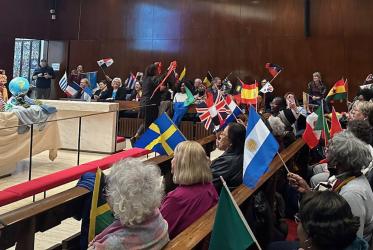by Marcelo Schneider*
“Faith communities, in almost all humanitarian contexts, are the key sources of social capital for life-saving, transformation and hope”, says Rudelmar Bueno de Faria, in a 16 Feb. interview given shortly after his nomination as the new general secretary of ACT Alliance, a partner organization of the World Council of Churches (WCC).
For the last three years, de Faria has been serving as the representative of the WCC to the United Nations (UN) and coordinator of the Ecumenical UN Office, in New York.
De Faria will take office as the new general secretary of ACT Alliance on 1 June, succeeding John Nduna, who has served as general secretary of the ACT Alliance since its founding in 2010.
De Faria’s professional career includes several years of work for LWF World Service, one of the top Christian organizations engaged in humanitarian work worldwide.
“Local faith communities are among the first responders, as they live in and are part of the disaster-affected population,” he says.
Speaking on the churches’ capacity for social mobilization and forms of moral standing, de Faria believes that the faith communities’ networks reach deep into rural communities and can provide routine access to communities and mobilize volunteers when needed.
Both WCC and LWF contributed to the founding of ACT Alliance with the goal of establishing a coordinated platform for ecumenical diakonia expressing the joint vision of the ecumenical movement with their member churches and specialized ministries to assist people in need.
According to de Faria, this vision is supported by many other ecumenical organizations worldwide. “Therefore, we all want an alliance of churches and church-based organizations that brings together different skills and expertise to work together for dignity, justice, peace, human rights and the environment protection”, he states.
De Faria goes on to say that he dreams of “an alliance that is recognized by its effective and accountable work in humanitarian, sustainable development and advocacy action and that works collaboratively with different stakeholders, including the UN and governments.”
Home church
De Faria’s church affiliation is with the Evangelical Church of the Lutheran Confession in Brazil (IECLB).
As executive secretary of the IECLB Church Development Office, he became engaged in the ecumenical movement. “At that time, the IECLB was already very active in national and international ecumenism, and I participated in some of the spaces in which diaconal work intersected with the work of other churches and ecumenical partners”, he says.
In 1995, de Faria was the representative of the IECLB in the ACT International Emergency Committee.
“The strong diaconal profile of the IECLB and its commitment to prophetic diakonia helped me to shape my understanding and actions to address the root causes of poverty, exclusion and inequalities in the world”, he adds.
Close partnership between WCC and ACT
Reflecting on the work being done by the WCC and ACT in New York, de Faria sees an “increasing opportunity for collaboration on peace and security issues”.
The work developed by both organizations at the Ecumenical United Nations Office (EUNO) focuses on the Sustainable Development Goals (SDGs), gender equality and religion and development.
De Faria speaks about the need to understand the distinctive roles that both WCC and ACT Alliance play in this field. “Not all advocacy strategies can be used universally”, he says.
“In some places, a direct action aimed to reach a key decision-maker may be politically dangerous, or may weaken or reduce the potential for long-term change”, adds de Faria. “Nevertheless, ACT Alliance members working in conflicting countries can be instrumental to WCC in its work with the UN Security Council on peace and security issues.”
Prophetic diakonia
“Diakonia for me is expected to be both political and prophetic, as the church’s ministry of denouncing injustices and announcing the ‘Good News’”, he says. “It transcends the church’s structures and becomes the unconditional support to all human beings. It is done in simple and compassionate deeds, saving-life activities, whose actions are motivated by my faith”, adds de Faria.
“The increasing recognition of the role of religion in development also represents an opportunity for ecumenical diakonia, as it affirms the distinct identity and competence of the faith-based actors, and adds energy to the commitment to save lives and struggle for justice.”
He sees that the 2030 Agenda for the SDGs provides “a political and transformational framework to address many of the root causes of issues that are diminishing people’s lives and damaging God’s creation.”
“My professional work is diaconal work. Therefore, it requires from me to side with the poor and oppressed, to denounce systemic injustice and promote human dignity, justice and peace.”
* Dr Marcelo Schneider is communication officer at the World Council of Churches
Links:






